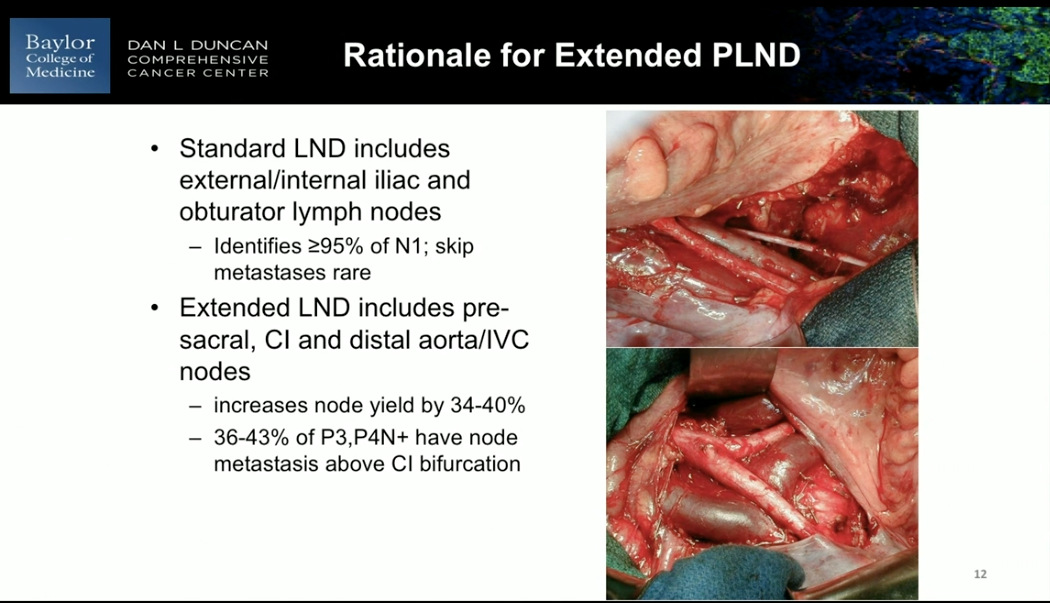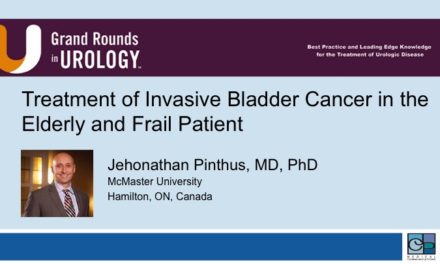Seth P. Lerner, MD presented “Lymph Node Dissection During Radical Cystectomy – Current State of the Art” during the 23rd Annual Innovations in Urologic Practice on September 14, 2018 in Santa Fe, New Mexico.
How to cite: Lerner, Seth P. “Lymph Node Dissection During Radical Cystectomy – Current State of the Art” September 14, 2018. Accessed [date today]. https://dev.grandroundsinurology.com/lymph-node-dissection-during-radical-cystectomy-current-state-of-the-art/
Lymph Node Dissection During Radical Cystectomy – Current State of the Art – Summary:
Seth P. Lerner, MD, describes the anatomy and stage specific association of lymph node metastasis. He reviews the evidence supporting the anatomic extent of bilateral pelvic lymph node dissection (PLND), specifically the status of current phase III clinical trials investigating extended versus standard PLND.
Abstract:
In 2018, The American Joint Commission on Cancer (AJCC) updated the TNM staging of urinary bladder cancer. Notably, while involvement of common iliac lymph nodes (LN) was a prognostic stage group IV characteristic, it is now a stage group III characteristic. This particularly impacts effect sizes for randomized clinical trials.
A stage specific lymph node metastasis mapping with bladder cancer undergoing radical cystectomy and PLND showed that of the patients with LN metastatic disease, the majority have multiple metastases, and about 30%-40% have metastases outside the true pelvis. Also, a study by Roth et al. mapped all lymph nodes in bladder cancer patients with a radiotracer. Results showed that PNLD including the extended template resected 92% of all lymphatic landing sites. Conversely, standard PLND resected 81%. Furthermore, data supports that the number of LNs removed correlates with outcomes in both node-negative and node-positive disease. A study testing sensitivity for LN metastasis suggested that extending the proximal limits of PLND, as well as quality of pathological analysis, increases the number of nodes identified and metastases sensitivity.
Clear evidence supports that a thorough PLND at the time of radical cystectomy has a significant impact on the incidence of local pelvic recurrence. Additionally, omitting a PLND leads to a cost in mortality outcomes. Because of these reasons, 2016 American Urological Association (AUA) guidelines and general urologic community supports standard bilateral pelvic lymphadenectomy as standard of care for
surgically curable non-metastatic disease. However, the benefits of extended PLND remains unclear. The completion of two major trials, the LEA AUO AB 25/02 and SWOG S-1011, will provide further data and conclusions regarding the utility of expended PLND.
About Innovations in Urologic Practice
Innovations in Urologic Practice (IUP) is an annual CME-accredited conference devoted to updating urologists on the rapidly changing healthcare environment. Topics focus on innovative diagnostic and treatment strategies, controversies, new and currently developing technologies, and challenges in today’s urologic practice. Dr. Lerner presented this lecture during the 23rd IUP in 2018. Please visit this page in order to learn more about future IUP meetings.
ABOUT THE AUTHOR
Seth P. Lerner, MD, is a Professor of Urology and holds the Beth and Dave Swalm Chair in Urologic Oncology in the Scott Department of Urology at Baylor College of Medicine. He is also Director of Urologic Oncology and the Multidisciplinary Bladder Cancer Program and Faculty Group Practice Medical Director for the Urology Clinic at Baylor. He earned his medical degree from Baylor College of Medicine, completed a surgical internship at Virginia Mason Hospital in Seattle, and returned to Baylor for his residency training. He completed a two-year fellowship at the University of Southern California in Urologic Oncology and Reconstructive Surgery under Peter Jones and Don Skinner before returning to join the full-time Baylor faculty in 1992. His clinical practice, education, and research activities are devoted to urologic oncology, particularly lower and upper tract urothelial cancer. Dr. Lerner is an author on over 190 peer-reviewed articles, and co-editor of the comprehensive Textbook of Bladder Cancer. He is the founding Co-Editor-in-Chief of the Bladder Cancer journal. He established and directs the multi-disciplinary Bladder Cancer Research Program at Baylor, and his research interests include the use of selective estrogen receptor modulators for the treatment of bladder cancer, gene therapy, integrated genomic analysis of bladder and upper urinary tract cancers, and outcomes of radical cystectomy and pelvic lymphadenectomy. He has 25 years of experience as a clinical investigator for both NCI and industry-funded clinical trials. He is the PI of the ongoing SWOG NCI Phase III trial comparing extended vs. standard pelvic lymphadenectomy at the time of radical cystectomy. He is Chair of the Local Bladder Cancer Committee of SWOG, founding and former Co-Chair of the NCI Bladder Cancer Task Force and current Co-Chair of the NCI CTEP Genitourinary Steering Committee, and he has co-chaired the Analysis Working Group of The Cancer Genome Atlas Project for muscle-invasive bladder cancer for the past decade. He is very active in the Bladder Cancer Advocacy Network (BCAN) as a member of the Board of Directors, and is Past Chair of the Bladder Cancer Think Tank and Co-Chair of the Management Committee of the Bladder Cancer Research Network. Dr. Lerner is an active member of the prestigious American Association of Genitourinary Surgeons and is listed routinely among “America’s Top Doctors” and “Best Doctors in America.”





